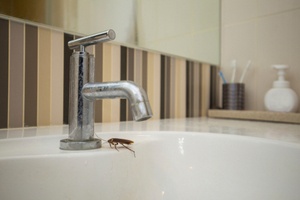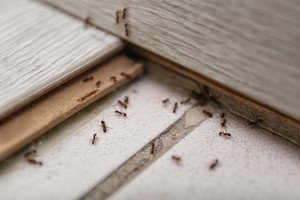When the weather is frigid, most people look forward to Spring – a time when not only the temperature increases but the bug population, too. Because severe temperatures can impact insect populations, some predict that Spring insects are in decline.
However, many species of bugs and insects are capable of surviving through the winter. When it comes to protecting your home from Spring insects, there are several issues to consider. Below is an overview of issues you’ll want to consider, and how to prevent those issues from turning into a home insect infestation.
Bedrooms

Spiders, fleas, roaches, bed bugs and ants may be present in the bedroom. Nobody wants to share a room with insects. Store your soiled clothes and bedding in the laundry area to avoid attracting insects to your bedroom.
Cover your mattresses with protective covers. This eliminates one of bed bugs’ favorite hiding spots. Vacuum your home on a regular basis, and eliminate clutter by sorting through your belongings and removing anything you haven’t used in a while.
If you want to eat in your bedroom, clean up after yourself. Otherwise, ants and cockroaches will view your leftovers and crumbs as an invitation to show up.
Basement
The gloomy and often-overlooked basement might be your home’s ideal insect haven. This is particularly the case if you have a stack of cartons or cardboard boxes full of goods that you haven’t touched in years.
To prevent your basement from becoming an insect refuge, declutter your basement and get rid of anything you don’t need. Less clutter means fewer hiding spots for bugs.
Bathroom

Water can attract mold mites, drain flies, silverfish and cockroaches. Cockroaches, for example, may go weeks without food but no longer than two days without water. Inspect your bathroom sink’s pipes for leaks to ensure that the bathroom is clean, dry, and won’t attract water-loving bugs.
Also, on a regular basis, clean up the black film that builds up inside drains. Many insects prefer wet, humid environments, so establishing adequate ventilation inside of your bathroom is a simple approach to keep pests from making your bathroom into their new home.
Kitchen
If humans see the kitchen as the heart of their house, bugs are likely to do the same. Insects feast on kitchen table crumbs, leftover food in the trash, overripe fruits on the counter, liquid splashes on the floor and cooking ingredients in the cabinets.
First, inspect your kitchen cupboards and pantry to keep insects from foraging for treats. Remove expired food and store the rest in airtight containers. Before shelving the rest of your food items, wipe down the inside of the cabinet and pantry space and cover it with shelf paper. Cover the trash can and use a sponge and a dab of dishwashing liquid to scrub down the tabletop and floor. As soon as you’ve finished your dinner, immediately wash the dishes. Set appliances away from the wall when cleaning the kitchen floor to access hard-to-reach areas.
Living Room
House flies, ants, bed bugs and carpet beetles can infest your living room. If you have a fireplace and notice an influx of insects, it’s the first place you should look when trying to find the insects’ access point. Cracks in an antique fireplace could provide an entrance for insects. Stink bugs, rats and raccoons are among the larger pests that might enter your home through the chimney. Termites, for example, could enter the house by latching on to the firewood.
Pay special attention to the carpet when vacuuming the living room. This is a common place for certain insects, like carpet beetles, to live. Mix white vinegar and water and apply it on bookshelves, windowsills, and other living room furniture to prevent them from harming your carpet and other household fixtures. This water and vinegar combination should also be applied to the carpet.
Pests to Watch Out for:
This season, keep an eye out for some of the more prevalent spring bugs.
Ants: Many people are surprised by ants in the spring because they appear out of nowhere, pouring in a line straight to your trash can, kitchen pantry, or cupboards with little warning.

Mice: Mice don’t hibernate during the winter, but they are more sedentary and do not normally forage as much. This changes in the spring, when mice are re-energized and ready to run around in full effect.
Termites: Termites are the biggest dread of any homeowner. Termites cause a lot of destruction of property and cost a lot of money every year. Miniature holes in your home’s wood, crumbling drywall, sagging doors or flooring, insect wings, and tiny shelter tubes are among the more obvious indications of a termite infestation to watch for.
Contact Us For Details
Spring is the time of year when everything comes alive. Bugs, unfortunately, can get caught up in the excitement. The good news is that you can take precautions to prevent them from ruining your season.
Contact a Spartan Animal and Pest Control specialist today to have your property evaluated for pest hazards and evidence of bug damage.



